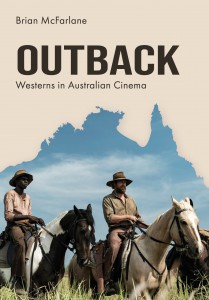Outback
Westerns in Australian Cinema


Average rating: ![]()
| 0 | rating | |
| 0 | rating | |
| 0 | rating | |
| 0 | rating |
Your rating: -
Book Presentation:
Studying the role of the Western film genre in Australia’s changing political and cultural landscape.
Focusing on the influence of the cinematic Western in Australian cinema history, Outback explores how the American genre has been adapted to the changing Australian social, political, and cultural contexts of their production, including the shifting emphases in the representation of the Indigenous population.
Brian McFarlane emphasizes the ways film can, without didacticism, provide evidence of changing politics and culture. McFarlane explores Australian history with the genre by analyzing such films as Charles Tait’s 1906 The Story of the Kelly Gang and Justin Kurzel’s 2020 adaptation of Peter Carey’s The True History of the Kelly Gang. He further explores other key matters, including the changing attitudes to and representation of Indigenous peoples and of women's roles in Australian Westerns.
See the publisher website: University of Chicago Press
> From the same author:
The Encyclopedia of British Film (2021)
Dir. Brian McFarlane and Anthony Slide
Subject: Countries > Great Britain
Four from the Forties (2018)
Arliss, Crabtree, Knowles and Huntington
Subject: Countries > Great Britain
Michael Winterbottom (2009)
by Brian McFarlane and Deane Williams
Subject: Director > Michael Winterbottom
New Australian cinema (1992)
sources and parallels in American and British films
by Brian McFarlane and Geoff Mayer
> On a related topic:
Transnationalism and Imperialism (2022)
Endurance of the Global Western Film
Dir. Hervé Mayer and David Roche
Subject: Sociology
Hell-Bent for Leather (2025)
Sex and Sexuality in the Weird Western
by Kerry Fine, Michael K. Johnson, Rebecca M. Lush and Sara L. Spurgeon
French Westerns (2024)
On the Frontier of Film Genre and French Cinema
Twisting in Air (2024)
The Sensational Rise of a Hollywood Falling Horse
Hold It Real Still (2022)
Clint Eastwood, Race, and the Cinema of the American West